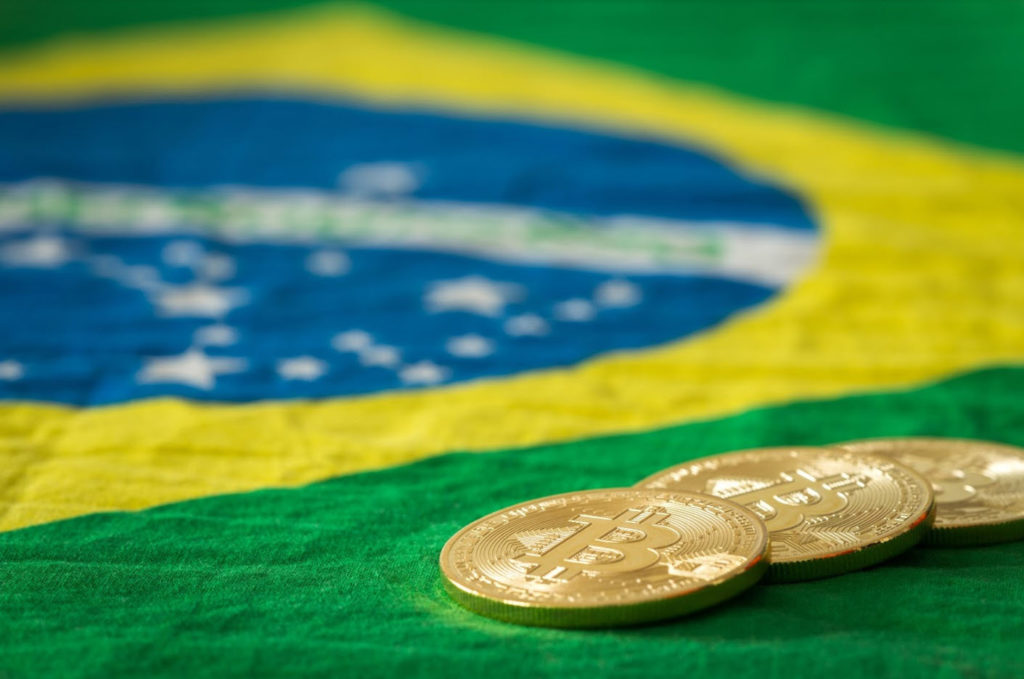Cryptocurrency, or digital currency, is a virtual currency designed to work as an electronic medium of exchange. Through cryptography, digital currencies verify and secure transactions while controlling the creation of new units.
There have been attempts to create digital currencies since the tech boom of the 90s, with systems like Digcash and Flooz emerging but inevitably falling. Then, in what appeared to be a breakthrough in cryptocurrencies, an anonymous programmer, alias Satoshi Nakamoto, introduced bitcoin – which is one of the most popular digital currencies in the world now.
In a move that is becoming a trend in economically-depressed countries, cryptocurrency and their underlying blockchain technology are witnessing an explosive growth in Brazil and other Latin American countries. Among all countries with cryptocurrency exchanges, Brazil ranks fifth in terms of the number of active exchanges.
The country’s high inflation and deep financial problems are driving millions in its population to jump on the crypto bandwagon. But what are some of the factors driving the popularity of digital currencies in Brazil?
Fiscal Crisis Gives The Incentive To Switch
As in most Latin American countries, Brazil has been wracked by severe financial issues in the last few years. High unemployment rates and the skyrocketing cost of living has hit the country so hard that it recorded its highest inflation rate in 13 years in 2016. Despite the risk associated with digital currencies, they are being viewed as viable alternatives to the shaky national currency.
Although the struggle with inflation-related issues is in no way unique to Brazil, the devaluation of Brazilian national currency – Brazilian real (R$) – against the US dollar has proven to be a key driver of adoption.
It’s no secret that hyperinflation can push masses to seek alternative currencies. In more developed economies where devaluation happens at a more relaxed and controlled pace, the scramble for cryptocurrency does not exist since there is no pressing need for an alternative currency.
Good For Remittances
If you’re accustomed to using cryptocurrencies, you would agree that there’s no quicker and more secure way to send remittances. Challenging conditions in Brazil, including recession, high unemployment rates, and inflation has seen approximately half a million Brazilians reside in the US, according to the Migration Policy Organization. The migrants, most of whom were looking for better economic opportunities, have been sending record amounts of money back home.
Throughout the Latin American region, blockchain-based solutions are increasingly revolutionizing international payments owing to their fast and theft-proof nature.
Latin Americans Have An Excessively High Interest In Cryptocurrency
Since 2012, cryptocurrency adoption has witnessed rapid growth throughout the world. However, it is becoming increasingly clear that these alternative currencies are more popular in less wealthy nations. In Latin America, for example, there are a lot more people catching onto digital currencies than many other parts of the world.
Many Brazilians are trooping online platforms like Crypto Head that provide information and trends on cryptocurrencies to ensure they keep abreast with new developments. According to Statista global consumer survey, Brazil is among the top five countries with the highest number of people that claim to own digital currencies.
Also, cryptocurrency exchanges like LocalBitcoins and Paxful have occasionally published charts that feature Brazil, and other countries in this region, as having relatively higher rates of cryptocurrency adoption.
Median Age
Brazil is one of the most exciting countries when it comes to fintech opportunities. With a median age of 32, the country is quite appealing to financial tech investments and international digital companies.
This could be the reason why Brazilians never miss a tech trend. Although they are rarely ever in the front, they follow and stick with trends. In fact, Brazil is expected to play a lead role both in the regulation and the development side of digital currencies.
Today, Brazilians are opening more cryptocurrency accounts than the traditional brokerage accounts. A report by Global Digital ranked Brazil ahead of other Latin American countries in terms of active cryptocurrency owners – ahead of Columbia, Mexico, and Argentina.
Brazilians Actually Use Crypto
Cryptocurrency is proving to be among the most exciting forms of payment in recent history. Most digital currencies provide near-instant transactions and offer technical solutions to issues with privacy, the unbanked population, and international payments. In Brazil, there is consistent usage of digital currencies for regular payments and remittances.
There’s no doubt that the mass adoption of digital currencies takes time and effort. However, Latin American countries, including Brazil, are increasingly using digital assets for non-speculative purposes, meaning that the region might be headed for a real full-scale usage far ahead of other parts of the world.
Scanty Regulation
The ever-increasing popularity of bitcoin and other digital assets has the country at a crossroads, as leaders are faced with the need to address the legality and usage of this emerging asset class.
Both houses of Brazil’s National Congress are still considering different proposals to regulate the industry. A special commission was created to analyze and make revisions to a motion referred to as Bill 2303/15. The Senate is also working on two other bills – PL 3825/2019 and PL 3949/2019, but it is yet to make public any specific legislation for the regulation of cryptocurrency in Brazil.
Nonetheless, all exchanges must realize that despite the absence of a specific regulation, they fall under the purview of Normative Instruction No. 1888 that was issued by the Department of Federal Revenue. Consequently, any company carrying out a crypto transaction in the country is required to report them or risk a fine ranging from $120 to $360.
The lack of regulation is one of the biggest hurdles to full-scale cryptocurrency adoption. This has led to a rise in criminal enterprises as money laundering, corruption and secrecy become a significant part of Brazil’s cryptocurrency adoption
Final Thoughts
The popularity of digital currencies in financially depressed economies is seemingly an established pattern that is now visible in Brazil and other Latin American countries. This means that, unlike in financially stable economies, financial issues are incentivizing Brazilians to adopt digital currencies.
Still, this is a perfect demonstration of cryptocurrency’s ability to protect wealth. As the blockchain revolution gathers more momentum, cryptocurrencies may serve as a stable alternative to national currencies during times of deep recession, spiraling unemployment, massive fiscal deficits, and political turmoil – as in the current case of Brazil.
DC Forecasts is a leader in many crypto news categories, striving for the highest journalistic standards and abiding by a strict set of editorial policies. If you are interested to offer your expertise or contribute to our news website, feel free to contact us at editor@dcforecasts.com
























Discussion about this post